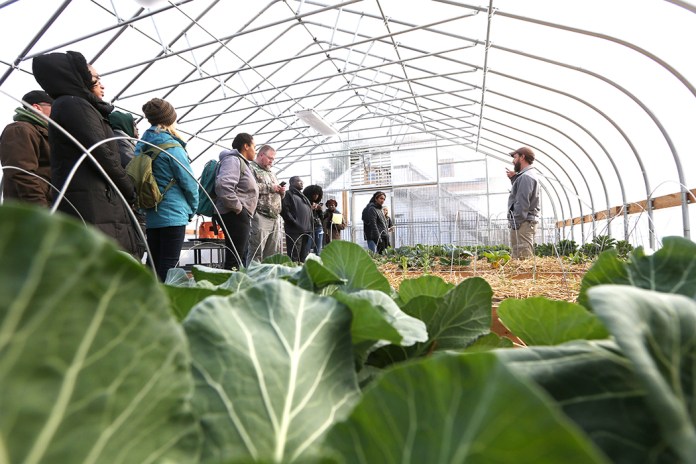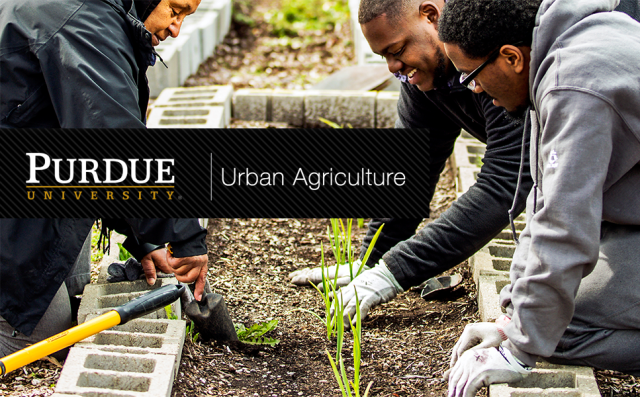Purdue Extension’s Urban Agriculture Certificate program offers participants the opportunity to learn how to successfully produce crops in urban settings.
In these uncertain times of the coronavirus, food shortages and food inequity, the concept of growing food in urban locations is gaining greater interest. The lack of access to fresh produce and the existence of food deserts in major cities are spotlighting the need for more communities, organizations and individuals to look for ways to help resolve these issues.

Expanding urban agriculture education
Purdue Extension has offered an urban agriculture program in Marion and Allen Counties since 2016. Indianapolis in Marion County and Fort Wayne in Allen County are the state’s largest metropolitan areas. The extension’s Urban Agriculture Certificate program classroom portion ran from October through March. Workshops were conducted during the spring and summer. About 20 people participated annually in Marion County and 10 participated in the Allen County programs.
“The people who attended these classroom programs included experienced urban farmers and some who were looking to get started in urban farming,” said Nathan Shoaf, urban agriculture coordinator at Purdue Extension. “In Marion County there were a few participants who were already doing urban agriculture. Some of them operated well-known neighborhood market stands. Others used the program as a motivator to expand community gardens. Many people who participated wanted to learn more about growing at home to feed their families or their local neighborhoods through community gardens.
“Some of the program’s participants struggled with the required weekly classroom attendance and the time commitment necessary to complete the program. Because of the amount of time and effort that was put forth by the extension staff to conduct the program, we were trying to figure out what we could do to get more people involved.”

Increasing access to a wider audience
During the four years the classroom program was offered the Purdue Extension staff had the opportunity to tweak the content and make revisions.
“We have had time to respond to the evaluations that we provided the students, responding to their feedback and tailoring some of the program modules to better meet their needs,” Shoaf said. “We gained from the students in regards to if there was a particular interest or if someone wanted to learn more about a particular topic or concept. We also received questions and comments about offering more courses online.”
In September 2019 the extension staff began working on a four course online certification program, Urban Agriculture Certificate, that would be available in September 2020. Two courses have been released and are available for completion. The first course, “Growing Guide for Healthy Crops,” launched in March.
“As we were working through the courses we figured the growing guide was something that people would want for the spring when they are starting their projects,” Shoaf said. “We put more emphasis on that course to make sure that it was available in March. We had about 15 people sign up for that course when it was first released.”
A second course, “Site Assessment for Fertile Ground,” was scheduled to be released in April.
“The second course focuses on soil contamination risks and discusses raised beds and best management practices to mitigate potential contaminant concerns and land use agreements,” Shoaf said. “Some people only want soil health information or site design. We used that feedback to help guide us in terms of course structure so that we could make sure those topics are complementary, but also separate.
“We are finding some of the participants are interested in site assessment and they may not even be from an urban ag background. They may have an environmental consulting or engineering background or are interested in brownfields or site redevelopment. One of the consequences of making these courses available individually is it brings new people to the table and makes them aware of these kinds of programs and urban ag in general.”
Focus on soil health, organic practices
The third course, “Agricultural Site Design and Soil Health,” is schedule to launch on May 18.
This course focuses on site design concepts in terms of designing an urban farm or community garden and covers soil health principles and techniques for achieving soil health, composting, vermicomposting, organic production, water management and irrigation topics.

“A lot of the organic production concerns and questions tie in with the soil health component,” Shoaf said.” Those topics fit together well for this module.”
Based on past coarse evaluations and input from farmers, most are interested in organic management techniques.
“We don’t shy away from discussing conventional agricultural practices,” Shoaf said. “Often times when I’m talking to farmers, they are really interested in determining site assessment and whether or not they can grow on a particular piece of land. Most want to be productive in a year or two. They want to know how to achieve this and ask for recommendations.
“I may have them collaborate with some of our extension specialists to make sure they’re achieving their soil health needs and fertility. We can also help them plan long term with organic amendments and compost applications and make sure they can find reliable suppliers. We stress the importance of an annual soil test to make sure these amendments are not being over-applied.”
The final course, “Roadmap for Strong Roots,” is scheduled to be available on June 22. This course focuses on crafting a mission and vision, asset-based community development team building, SMART goals and funding.
“The Roadmap is really the first course that we recommend that participants take,” Shoaf said. “Even though we recommend this course first, participants are allowed to start in the order that they want.”

Online courses offer flexibility
Shoaf said the certificate program has generated a lot of questions from people who want to receive additional information as the courses become available.
“That is a good sign to me that shows there is interest in the program and not just from people in state,” he said. “Besides in-state inquiries, we have received inquiries from people in 13 states and even Cambodia. We have also reached a broader in-state audience besides our two largest metropolitan areas. We wanted to demonstrate that the interest in urban ag doesn’t only happen in major metropolitan areas and anyone could be dealing with urban soil challenges.”
Once all the classes are available, they don’t have to be taken in any specific order.
“Some of the feedback we were getting was people wanted to pick what they needed and move on,” Shoaf said. “We found students might be engaged in one particular topic area or one module and that might be all that they need for their operation or their goals. We wanted to enable them to dictate what they wanted and how they wanted to navigate through the program.”
Shoaf said the extension staff has tried to balance the courses.
“There is a lot of video content that we have created during the last couple of years,” he said. “There may be people who have less experience in some areas than others so they may need to pause a video more often or need to take more notes.
“At the end of each course there is an assessment quiz that participants must complete at least 80 percent. Each quiz is about 20 questions each. There is also a final evaluation for the certification program. The evaluation can help us learn what works and what doesn’t. This input from the students will be used to improve the program.”
For more information on these courses and the Urban Ag Certificate, go to https://www.purdue.edu/dffs/urbanag/programs/urban-ag-certificate/
For more: Nathan Shoaf, Purdue Extension, West Lafayette, IN 47907; nlshoaf@purdue.edu.
This article is property of Urban Ag News and was written by David Kuack, a freelance technical writer in Fort Worth, Texas.





What does it cost per course?